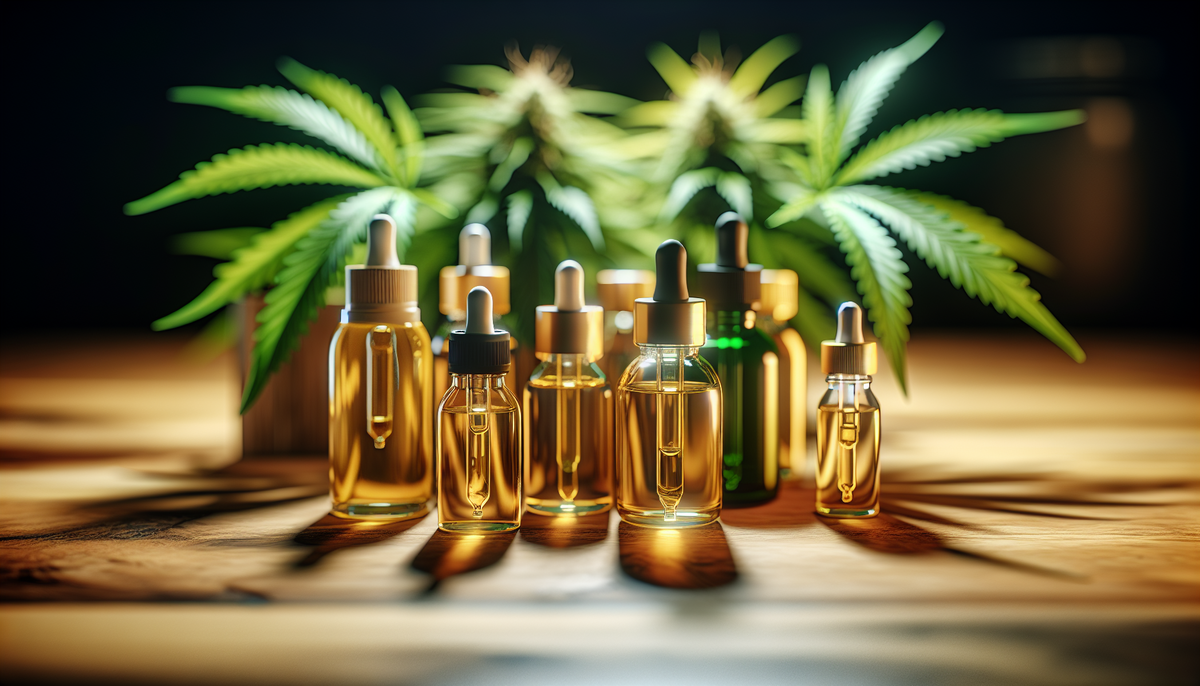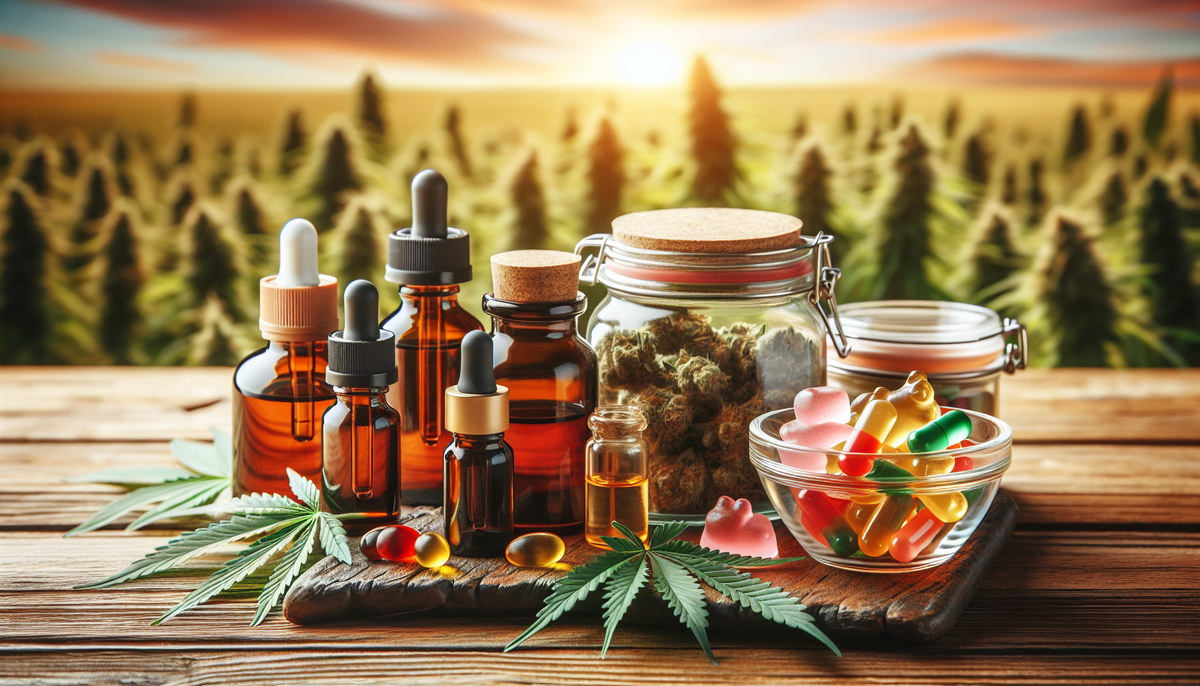Finding Your Ideal CBD Oil Dosage: Guide to Benefits & Safety
Written by: Daniel Fayad, Subject Matter Expert and Website President
Published: March 15, 2024; Last updated: April 6, 2024
- 1. Key Takeaways
- 2. Understanding CBD Oil and Its Therapeutic Potential
- 3. Navigating CBD Oil Dosages
- 3.1 Starting Points for CBD Dosage
- 3.2 Calculating Your CBD Oil Dosage
- 4. The Legal Landscape of CBD Oil
- 5. Diverse Forms of CBD Oil Products
- 5.1 Sublingual Oils and Tinctures
- 5.2 Edibles and Capsules
- 6. Factors Influencing CBD Oil Efficacy
- 7. Safety Considerations and Possible Side Effects
- 8. Identifying High-Quality CBD Oil
- 9. Personalizing Your CBD Journey
- 10. Summary
- 11. Frequently Asked Questions
- 11.1 How much mg of CBD oil is enough?
- 11.2 Is CBD 25 mg a lot?
- 11.3 What is 2000mg CBD oil good for?
- 11.4 What factors influence my ideal CBD dosage?
- 11.5 What are some potential side effects of CBD oil?
- 12. References
Are you confused about how much CBD oil to take? You’re likely looking for a dosage that provides relief without the guesswork. Tailored to your body weight, condition, and response, this guide aims to equip you with the knowledge to fine-tune your CBD oil dosage for optimal results.
Key Takeaways
CBD oil is derived from hemp and offers potential health benefits without the psychoactive effects of THC, but more research is needed to understand its efficacy and safety fully.
Proper CBD oil dosage varies with individual factors such as body weight and condition severity, and it’s best determined through personal experimentation with guidance from healthcare professionals.
Legal changes have allowed the regulated cultivation of hemp and broadened the legality of CBD oil, and quality CBD products should have third-party testing and a Certificate of Analysis.
Understanding CBD Oil and Its Therapeutic Potential

CBD, the predominant active compound found in hemp, a cousin of the marijuana plant, is making waves in the wellness industry. Unlike its psychoactive relative THC, CBD offers potential therapeutic advantages without the ‘high.’ With CBD legal in many places, nonprescription CBD products such as CBD oil are renowned for their myriad of health benefits, including how much CBD can help in:
Alleviating chronic pain
Managing anxiety
Reducing inflammation
Improving sleep quality
Treating epilepsy and seizures
Supporting heart health
Relieving symptoms of depression and PTSD
With its wide range of potential uses, CBD oil is becoming increasingly popular as a natural remedy for various health conditions. ¹
However, bear in mind that scientific research in CBD is still developing. As such, while existing studies suggest CBD’s promising therapeutic potential, further research is necessary to understand and validate its efficacy and safety fully.
Navigating CBD Oil Dosages
Establishing the appropriate CBD oil dosage involves more than adhering to a standard chart. It depends on various factors, including weight, tolerance, and desired therapeutic effects.
Starting Points for CBD Dosage
When determining how much CBD to take, the initial CBD dosage recommendations vary based on the individual’s weight and the specific condition being addressed. For instance, someone with a higher body weight might need a larger dosage to achieve the same effects as someone with a lower body weight. It’s essential to consider various CBD dosages to find the most suitable one for each person.
Moreover, the severity of the treated condition can influence the initial dosage. Higher doses of CBD generally yield more favorable therapeutic results, especially for more severe conditions. ³
Calculating Your CBD Oil Dosage
Grasping the potency of your CBD product plays a pivotal role in setting the correct dosage. The best way to find your ideal CBD dosage is through personal experimentation. Start with a modest dose, observe your body’s response, and adjust the dosage accordingly.
A wealth of online resources, like dosage calculators and questionnaires, can help you calculate CBD dosage to determine the best CBD dosage. Furthermore, consulting a healthcare professional can provide personalized recommendations, ensuring you find the best dosage.
The Legal Landscape of CBD Oil
Unraveling the legal intricacies of CBD oil can be complex. It’s undergone significant changes recently, most notably with the 2018 Farm Bill. Before this bill, the legal standing of CBD oil was often deemed unlawful.
The 2018 Farm Bill effectively removed hemp, including hemp-derived CBD oil, from the controlled substances list, marking a milestone in CBD oil legality. The bill sanctioned the regulated cultivation of hemp, defining it as any cannabis plant with a delta-9 THC content of no more than 0.3 percent.
Diverse Forms of CBD Oil Products

CBD oil does not adopt a one-size-fits-all approach. It comes in various forms, each offering different dosages and onset times.
Sublingual Oils and Tinctures

Sublingual oils and tinctures are frequently preferred due to their quicker absorption rates. They’re typically administered by placing the substance under the tongue for about a minute before swallowing, facilitating speedy absorption into the bloodstream.
The suggested starting dosage for these products is a small amount, typically 0.25 milliliters, which can be adjusted based on individual reactions and requirements. Remember, tinctures usually contain higher concentrations than oils, requiring dosage modifications when shifting between the two.
Edibles and Capsules

Edibles and capsules provide a more convenient and discreet way to consume CBD. They come in various forms, including:
Gummies
Cookies
Chocolates
Granola bars
While the precise dosage and portability of these products are advantageous, they take longer to take effect due to the digestive process.
CBD tablets, on the other hand, offer precise dosing and portability but can be harder to adjust for dosage. Despite the slower onset of effects, edibles provide the convenience of being easily portioned into smaller doses, making them a popular choice for many.
Factors Influencing CBD Oil Efficacy
The effectiveness of CBD oil doesn’t hinge solely on the dosage. Other factors, such as the type of CBD extract, can also play a significant role. Some types of CBD extract include:
Full-spectrum CBD, which includes other cannabinoids, can provide improved pain relief due to their combined effects
Broad-spectrum CBD, which contains multiple cannabinoids but no THC
CBD isolate, which has only pure CBD with no other cannabinoids
Considering the type of CBD extract can help you choose the most effective CBD oils for your needs.
The mode of CBD administration can also influence its effectiveness, with different methods leading to varying absorption rates. Also, keep in mind that CBD oil can interact with a wide array of medications, underscoring the importance of seeking medical advice before simultaneous usage.
Safety Considerations and Possible Side Effects
While CBD oil is generally deemed safe, it’s vital to consider potential side effects and safety implications. Even at higher doses, CBD is usually well-tolerated, but those with underlying liver conditions should exercise caution, particularly when consuming large doses.
Excessive CBD usage may lead to adverse effects such as:
Dry mouth
Nausea
Diarrhea
Upset stomach
Drowsiness
Lightheadedness
General disorientation
In rare instances, liver damage
Monitoring these effects and seeking medical advice can ensure a safe and beneficial CBD journey.
Identifying High-Quality CBD Oil

Given the vast array of CBD products available, pinpointing high-quality CBD oil can prove challenging. Trustworthy sources typically offer approved nonprescription CBD products with third-party testing and a Certificate of Analysis (COA), ensuring their safety and efficacy.
Independent laboratories conduct these tests to verify the chemical properties of the products and guarantee that they match their advertised specifications. It’s also crucial to screen for contaminants like heavy metals and psychotropic cannabinoids, which should be absent in top-notch CBD oil.
Personalizing Your CBD Journey
Determining the appropriate CBD oil dosage is not a one-time activity. It requires patience, experimentation, and personalization. Consulting with a healthcare provider is crucial to ensure a safe and appropriate dosage, especially when concurrently using other medications.
When customizing your CBD oil regimen, follow these steps:
Start with a low dosage and gradually increase it.
Maintain consistent use and carefully document your experiences.
Be mindful of potential side effects.
Seek medical advice when necessary.
By following these steps, you can ensure that you make the most of your CBD journey.
Summary
In conclusion, navigating the world of CBD oil involves:
Understanding its therapeutic potential.
Mastering dosage calculations.
Staying abreast of legal changes.
Considering the diverse forms of products.
Personalizing your CBD journey.
While CBD oil offers promising health benefits, using it safely and responsibly is vital, so high-quality products should always be prioritized, and professional advice should be sought when needed.
Frequently Asked Questions
How much mg of CBD oil is enough?
For general use, aim to take anywhere between 18 and 60 mg of CBD oil per day based on the symptoms you’re trying to alleviate. It’s also recommended to stay below 70mg to avoid interference with other medications.
Is CBD 25 mg a lot?
25 mg of CBD is a typical lower dosage and can be a good starting point, especially for CBD-only products. It’s recommended to start with this dose and gradually increase it until you achieve the desired effects.
What is 2000mg CBD oil good for?
2000mg CBD oil promotes relaxation and healthy sleep patterns, making it suitable for beginners seeking better sleep support.
What factors influence my ideal CBD dosage?
Your ideal CBD dosage is influenced by body weight, tolerance, and desired therapeutic effects. Consider these factors to determine your dosage.
What are some potential side effects of CBD oil?
Some potential side effects of CBD oil may include dry mouth, nausea, diarrhea, upset stomach, drowsiness, and lightheadedness. Be mindful of these when using CBD oil.
References
Sholler, D. J., Schoene, L., & Spindle, T. R. (2020). Therapeutic Efficacy of Cannabidiol (CBD): A Review of the Evidence from Clinical Trials and Human Laboratory Studies. Current addiction reports, 7(3), 405–412. https://doi.org/10.1007/s40429-020-00326-8
Millar, S. A., Stone, N. L., Bellman, Z. D., Yates, A. S., England, T. J., & O’Sullivan, S. E. (2019). A systematic review of cannabidiol dosing in clinical populations. British journal of clinical pharmacology, 85(9), 1888–1900. https://doi.org/10.1111/bcp.14038
Arnold, J. C., McCartney, D., Suraev, A., & McGregor, I. S. (2023). The safety and efficacy of low oral doses of cannabidiol: An evaluation of the evidence. Clinical and translational science, 16(1), 10–30. https://doi.org/10.1111/cts.13425

Written by Daniel Fayad - Subject Matter Expert and Website President
Dan Fayad is a results-driven healthcare administration expert and content writer. With a Master of Health Administration from the University of Southern California, he’s carved a niche for himself in the dynamic world of healthcare and business development. Dan uses his experience to educate and empower people on their wellness journeys.
Join the CBDeals Club!
Get 10% off your first order and receive our best and exclusive promotions directly to your inbox!

